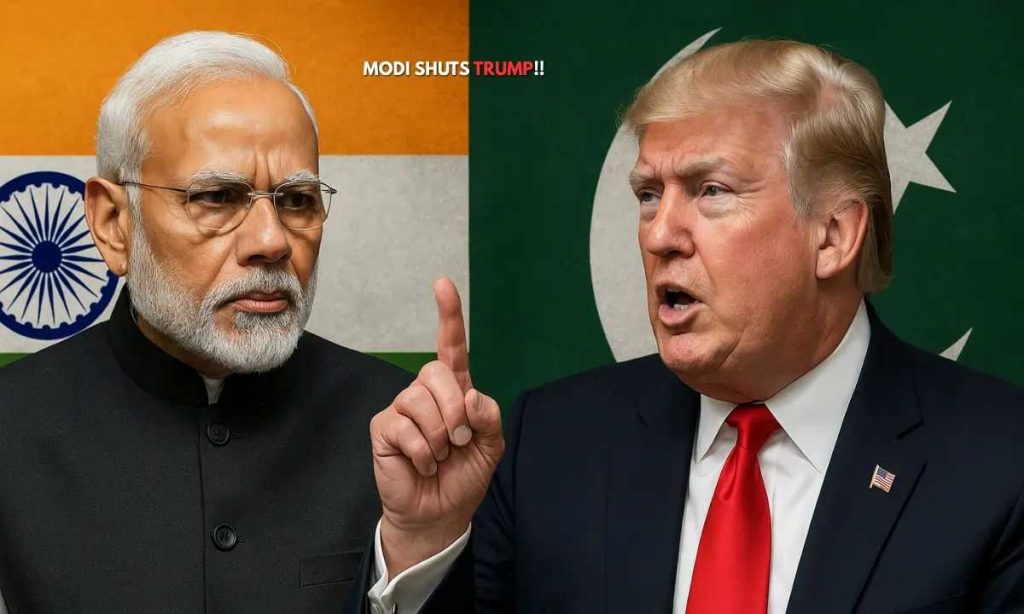In a significant diplomatic exchange, Prime Minister Narendra Modi firmly rejected U.S. President Donald Trump’s assertion that the United States brokered the recent ceasefire between India and Pakistan following Operation Sindoor. The rebuke came just hours after a high-level phone call between the two leaders on June 18, 2025, triggering strong political ripples across South Asia and Washington.
The backdrop to this exchange is a delicate one. In April, India launched Operation Sindoor in retaliation to a devastating terrorist attack in Jammu & Kashmir’s Pahalgam region, which claimed the lives of 32 civilians. The airstrikes targeted terror launchpads in Pakistan-occupied territory, escalating military tensions in the region. Although a ceasefire was reached in early May, the origin and diplomacy behind the de-escalation have become a hot topic in global politics.
Donald Trump’s Bold Claim: “I Stopped the War”
During a press briefing earlier this week, President Donald Trump emphatically declared that it was his intervention that stopped an imminent war between the two nuclear-armed neighbours.
“I stopped the war,” Donald Trump said. “I made calls. I got both sides to calm down. Nobody talks about it, but that’s what happened.”
Trump stated that he personally contacted both Prime Minister Modi and Pakistan’s Chief of Army Staff General Asim Munir in the days following the Indian airstrikes. According to Donald Trump, his intervention was decisive in averting a wider conflict and leading to the ceasefire.
Source: CNN-News18
India’s Sharp Response: “No Third-Party Mediation”
Within hours of Donald Trump’s statement, India issued a firm response through Foreign Secretary Vikram Misri. He confirmed that while Modi did speak to President Trump, India firmly conveyed that it does not accept third-party mediation in its bilateral issues with Pakistan.
“India has never accepted, and will never accept, any third-party role in discussions with Pakistan,” said Misri.
He further clarified that the ceasefire was a result of back-channel military communications between Indian and Pakistani DGMO (Director Generals of Military Operations), and that any suggestion of foreign mediation was “factually incorrect and misleading.”
What is Operation Sindoor?
Operation Sindoor was a series of precision strikes conducted by the Indian Air Force on May 2, 2025, targeting terror training camps in Muzaffarabad and Kotli. The operation was launched in response to a major terror attack in Jammu & Kashmir on April 22.
The strikes marked a significant escalation and drew immediate international attention. Though Pakistan retaliated with artillery shelling, both nations avoided full-scale war, with hostilities easing by May 10.
Ceasefire or Coincidence?
The timeline surrounding the ceasefire has led to competing narratives. According to Pakistan’s Ministry of Foreign Affairs, Islamabad acknowledged Washington’s role in encouraging a de-escalation. This was also echoed by Pakistani military spokespersons who welcomed Donald Trump’s “timely intervention.”
However, the Indian Ministry of External Affairs stood firm, stating that de-escalation was initiated independently through direct military channels. The Indian government has consistently denied any involvement from the United States or other foreign governments in the ceasefire process.
A Delicate Diplomatic Dance
The phone call between PM Modi and Donald Trump lasted 35 minutes and covered not just regional security but also Indo-U.S. trade, defence partnerships, and upcoming global summits. According to the Indian government, PM Modi invited Donald Trump to the upcoming QUAD Summit in New Delhi, scheduled for August. Donald Trump reportedly expressed interest but cited scheduling constraints.
This interaction underscores a larger diplomatic theme: while India and the U.S. continue to strengthen strategic ties through forums like the QUAD and bilateral trade agreements, India remains cautious about maintaining strategic autonomy, especially regarding sensitive issues like Pakistan and Kashmir.
Opposition Reacts: A Political Storm Brews
Back home, the phone call and the surrounding controversy gave fresh ammunition to the opposition. Congress leaders like Jairam Ramesh and Rahul Gandhi questioned the BJP government’s transparency on national security matters.
Ramesh tweeted,
“Triple jhatka in one call: DonaldTrump claims ceasefire credit, Pakistan praises it, and BJP stays silent. Is India still calling the shots?”
In response, the BJP hit back, calling Jairam Ramesh a “congenital liar” and reaffirming Modi’s statement that India maintains full sovereign control over its foreign policy decisions.
Implications for India-U.S.-Pakistan Triangle
This episode exposes the fragile balance between geopolitical optics and diplomatic reality. While President Trump positions himself as a global mediator—a strategy seen in past efforts with North Korea and Ukraine—India remains firm on rejecting third-party roles in South Asian affairs.
Meanwhile, Pakistan’s top military officials are scheduled to visit Washington next week. This will likely include discussions on counter-terrorism cooperation and regional stability, suggesting Pakistan’s renewed interest in U.S. support amid economic instability and mounting internal pressures.
Global Reaction: Mixed but Watchful
Experts from global think tanks remain divided. While some argue that any pressure to de-escalate is positive, others warn that credit-claiming undermines sovereign decisions, especially when it comes to sensitive border conflicts.
Michael Kugelman of the Wilson Center tweeted, “U.S. diplomacy might’ve helped nudge both sides—but claiming full credit risks diplomatic backlash. India doesn’t like being patronized.”
Conclusion: A Tense Peace and Watchful Eyes
As tensions subside, the recent developments reflect not just the complexity of India-Pakistan relations but also the tightrope global powers walk when engaging with two nuclear neighbours.
President Donald Trump’s eagerness to position himself as a dealmaker continues to clash with India’s emphasis on autonomy. For now, the guns are silent—but the political noise is far from over.
